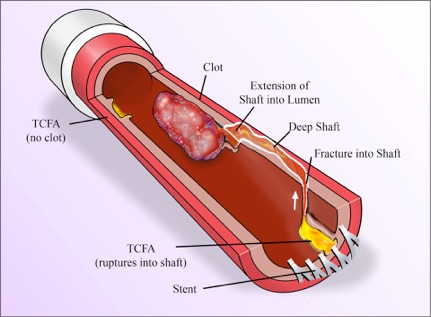New MECHANISM FOR TCFA
PROGRESSION TO ACS

New MECHANISM FOR TCFA
PROGRESSION TO ACS
TCFA RUPTURE INTO NECROTIC CORES
OR ‘SHAFTS’ LEADING TO Acs
Concept: Most acute coronary syndromes (ACS) are caused by the rupture of thin-capped fibroatheromas (TCFAs). TFCAs are characterized by a large necrotic lipid core, a thin intimal cap (<100 μm), and minimal protrusion into the lumen. TCFAs can be reliable visualized by optical coherence tomography (OCT). Complicating ACS prevention though is the inability to identify the small percentage (less than 20%) of TCFAs that lead to ACS. Therefore, lesion specific intervention can’t currently be performed. In this paper, we propose that ACS occurs with those TCFAs in close proximity or contiguous with a necrotic core or ‘shaft’. On TCFA rupture, blood forces evacuation of the large volume, deep thrombogenic shaft. The release of the core back into the lumen occurs downstream from the TCFA. The burden of the large volume thrombogenic material entering the lumen (not from the TCFA but the shaft) results in catastrophic clot formation. Case studies supporting this conclusion are presented. This mechanism would account for the progression of certain TCFAs to ACS. Assuming the postulate to be correct, three and not two dimensional assessment of plaque is warranted. Three dimensional imaging can be substituted by sequential two dimensional imaging.
Figure 1. An illustration of the case is shown here of the principles. In this figure, in the proximal portion of the sketch, a TCFA is ruptured by stent struts. The TCFA fractures into a near by deep core/shaft from blood pressure. The blood drives through the shaft and re-enters the lumen distally. A clot forms not at the TCFA or stent, but along the wall where the shaft reconnects with the lumen distally. Another ruptured TCFA is seen distally but it has minimal core and also no observable clot.
Work a collaboration between Mark Brezinski MD, PhD, and Kishore J. Harjai, MD, MMM, FACC
Contact: Mark E. Brezinski MD,PhD
Brigham and Women’s Hospital
75 Francis Street
Boston, Mass. 02115
T: 1-617-233-2802
F: 1-617-732-6705
Email: mebrezin@mit.edu
